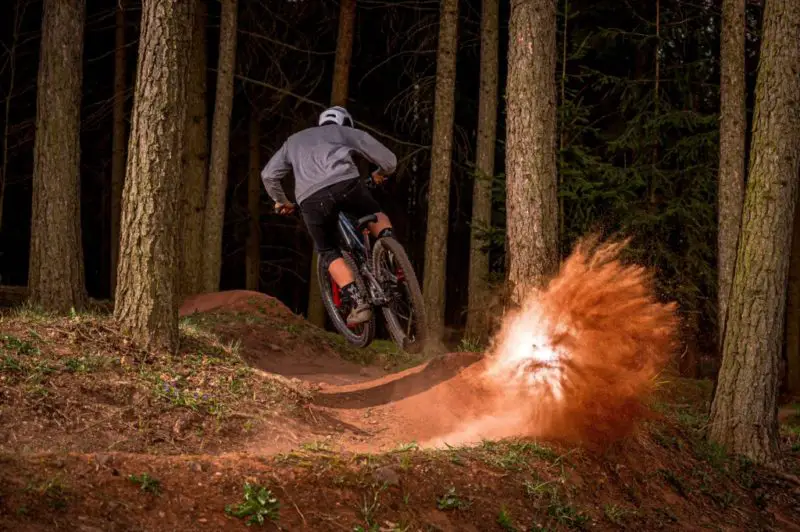I’ve been watching the Mountain Bike Downhill World Cup and Enduro World Series the past couple weeks, and it’s truly amazing how fast some riders can go on super steep, technical trails! It makes me want to buy a downhill bike, book a trip to the nearest bike park and give it a go myself!
Only one thing is stopping me: I’m not that good a rider…yet!
Mountain biking is like any other activity; it takes a while to get good enough to do all the cool stuff you see other people doing on YouTube. With consistent practice, you’ll get there! But how long does it take to get that good?
As a general rule, it takes about 1-2 years for a beginner mountain biker to reach “intermediate” proficiency. Then, it takes another 1-2 years of training, to reach expert status. But, this assumes consistent practice with an effective training plan, and not everyone will reach this goal.
In other words, it takes many years to go from a complete newbie to a pro-level mountain biker. But if you just want to be able to ride some cool trails and features in a fun and safe way, this can usually be done more quickly.
Let’s break down the stages every rider must pass through on the way to greatness, and look at the best, most efficient way to improve your riding, whether your goal is hoisting a trophy on the podium or just riding your local trails with a little more confidence!
How Long Does it Take to Get Good at Mountain Biking?

Being a “good” mountain biker means different things to different people. If you ride cross-country, that guy who can tackle the steep climb that leaves you gasping for air is a good rider. If you love shredding laps at the bike park, that girl who just threw a whip over a 40 foot double is a good rider.
There are many different mountain biking disciplines that require slightly different skills to master; but there are some skills that that good riders need to have, across all disciplines. Often, these skills must be achieved in a certain order for you to keep progressing, as they build upon each other.
As you develop these skills, you move from a complete newbie, to intermediate, and finally to expert level. And it generally takes about 1-2 years of riding to move from one experience level to the next level.
But not all experience is equal!
If you ride once a month, you can’t expect to progress as quickly as someone who hits the trails every weekend. Achieving pro status takes more than just a lot of hours per week with your butt in the saddle: you need to plan your mountain bike training and spend time deliberately practicing certain skills and abilities if you want to get better!
Let’s take a look at some of those skills now, and how achieving them will “level you up” into a more advanced rider category!
3 Skill Levels (And How Long to Get There!)
Beginner
The place where we all start. Where pointing our bike down even the easiest of green trails is intimidating. Where we sometimes wonder what we’ve gotten ourselves into.
These feelings are a natural part of being a beginner at any activity. Luckily, we don’t have to stay here if we choose not to! So what skills should we learn at the beginner stage to help us advance to the next level? Bunny hopping? Jumping? Doing a backflip?
Nope. Let’s start smaller.
The first thing you should attempt to master as a beginner is body position on the bike. This is the most fundamental skill, and is necessary for achieving all others.
Learning proper positioning will help you develop bike-body separation – or learning to move the bike independently from yourself. This will allow you to get comfortable shifting your weight front to back and side to side; things you’ll do frequently during a ride.
In addition to riding position, you want to develop good shifting and braking habits: after all, without learning how to stop and go, you might as well be riding a spin bike! These may sound straightforward, but doing them well actually takes a bit of practice.
Finally, trails have straight bits, but they also sometimes go left or right…these are called turns (I know, they sound pretty complicated). Cornering is a very important skill to learn as a beginner. If you remember Newton’s 1st law of motion, unless you practice changing direction, it’s very easy for your momentum to carry you straight off the trail.
For a more in-depth look at these beginner skills, check out my article Is Mountain Biking Hard to Learn? (For Total Beginners) before continuing on!
If you’re consistent–remember what I said above about deliberate practice!–you can expect to master the beginner skills within your first year.
You may find it hard to ride for long periods of time as a beginner, because you haven’t yet built up a lot of endurance. However, this usually has less to do with mountain biking experience and more to do with overall fitness level: both endurance and strength.
I have a friend who’s an advanced road cyclist and does a few 80-100 mile rides a week. He went mountain biking with me once, and while he’d leave me in the dust when the trails were mellow, once he came up to a jump, drop, or technical downhill section, he’d stop dead in his tracks…while I’d hit the feature and wave as I flew by him!
It’s about how you train as much as it is the amount of experience you have!
Intermediate
It’s at this level that you begin to link together the really fun trails!
You’re able to pull off manuals (even very short ones), and bunny hops (even if they’re not very high). You’ve also developed the basic technique for hitting drops and jumps, and have progressed from smooth, flowy trails to tackling more technical terrain. You now welcome the challenge of riding over roots and rocks!
You’re also beginning to get comfortable with going faster, including in flat and bermed corners. Looking for ways to increase speed is a sure sign you’ve upgraded to the intermediate level!
If you’re riding frequently–and training off the bike as well–you should also notice fatigue doesn’t set in as quickly. You’ll be able to ride longer without having to stop as often to catch your breath!
With consistent practice, it should take roughly another year to be proficient in enough of these skills to earn the title of intermediate rider.
Now, these skills won’t all develop equally–some might click with you right away, while others take more time. I consider myself an intermediate rider even though I still can’t hold a manual very long. We all progress at different rates, and that’s ok!
Expert
Maximum speed, maximum air, maximum fun!
You’ve been progressing to bigger and bigger jumps and drops, tackling technical trails with confidence, and shaving seconds off your lap times.
The true sign of an expert rider, though, is their ability to see alternate lines down a trail. To consciously choose the path less traveled. To look at an “impossible” feature and say, “Yeah, I got this.”
At this level, your fitness should be on point! You understand that improving your riding performance takes more than just riding; you’re also including weight training, conditioning, mobility work and proper nutrition into your weekly routine. After all, pro riders have strength and nutrition coaches…why shouldn’t you?
To become an expert (in anything) takes years of practice and persistence. Just trying out a trail rated Advanced or Expert does not make you one–trust me, I know from experience! When you’re finally able to manage clean runs down these types of trails, you can begin to think of yourself as an expert rider.
But don’t get too full of yourself: there is always more to learn to take your skills and abilities even further!
Is It Hard to Get Good at Mountain Biking?
All activities have their unique challenges, whether it’s a physical activity like mountain biking, becoming a better home chef, or learning a new language. But if it were easy, would it even be worth doing? Where would the sense of accomplishment be when you see yourself improving over time?
As I mentioned earlier, the more you ride, the better you’ll get. But you must be deliberate with your training. Keep developing the skills you’re good at, but spend extra time working on the ones you suck at! It may be tough at times, but the feeling of successfully doing something challenging for the first time is hard to beat.
Keep pushing your abilities, keep learning, and keep riding! That’s the only formula for becoming a great mountain biker!
Check out this article to learn more about the average times and distances of mountain biking.
